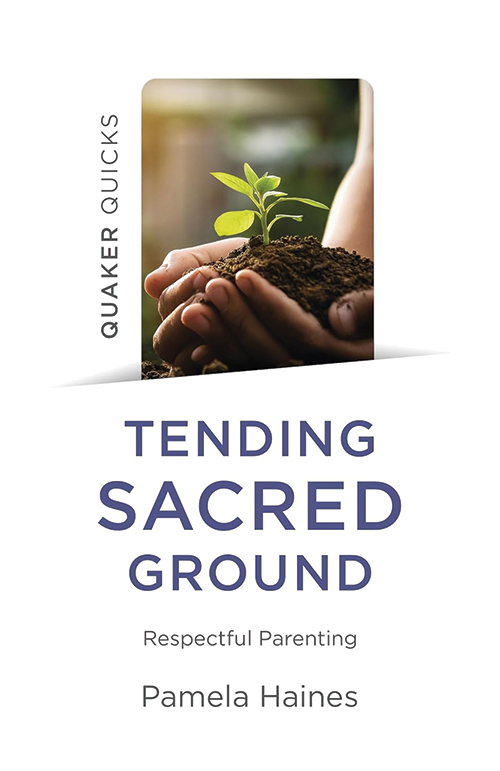
Tending Sacred Ground: Respectful Parenting
Reviewed by Janaki Spickard Keeler
March 1, 2024
By Pamela Haines. Christian Alternative Books (Quaker Quicks), 2023. 96 pages. $12.95/paperback; $6.99/eBook.
As parents, we often long for straightforward answers to our parenting questions, but the dilemmas we face are rarely simple. Should I allow my child to play with toy weapons? How do I help my kid respond to bullying? When is it better to let my child learn from the natural consequences of her actions, and when is it better to intervene to avert disaster?
Pamela Haines shares stories from her own parenting journey that model her approach of “respectful parenting.” She rarely has direct answers or advice for the big questions, but her honesty and the intentional way she approaches each interaction help us look at the bigger picture of how to parent in a world that often does not look out for our children’s best interests.
Haines respects children in a way that is refreshing to those of us who have read many books that seem determined to trick or force our children into a particular mold. She respects their emotions and agency, and she respects her own emotions and agency as well. Reading her reflections, I get the sense that she never loses the awareness of that of God in each child she meets. Her basic orientation is summed up in a beautiful query: “What if we assumed that our children . . . are completely good, regardless of what they do. The question of a non-cooperative child shifts from ‘Why are you bad?’ to . . . ‘Why are you, who are so good, doing these things?’”
Each of the 40 vignettes in the book paints a picture: a conflict, a misgiving, a big structural problem that affects our families and our communities. The book’s eight chapters explore the metaphor of tending sacred ground, growing a garden today and for the future. Themes of cultivating respect, resilience, humility, connection, discernment, joy, inclusion, and a wider view are explored through stories of parenting her two boys from babyhood into their teens. Haines maintains an engaging tone throughout and is forthright about her frustrations and failures. She has a knack for spotting how emotions and power imbalances between parent and child, and between siblings, can manifest, and she illustrates some of the ways she’s navigated these tangles.
There are many gems to be found in 96 pages, and each one made me pause and consider more deeply the spiritual practice of learning to delight in a child’s spirit, day in and day out, when the work of parenting can be so challenging. Those looking for wisdom from a fellow-traveler in the baby, toddler, child, and teenage groups will find much to appreciate. Haines explores teaching children to be thoughtful of others, rather than to just follow rules; being present to our children’s big emotions, even when we don’t understand the depth of feeling over small matters; helping children navigate things they are not good at; quality time; becoming the kind of parent that a child can disclose abuse to; what teenagers need in the years when they’re too “cool” to ask for their parents’ love; how to navigate the distorted messages of our commercialized culture; bullying; toxic masculinity; and raising children who have friendships across race, class, religion, and ethnicity.
What I found spoke most to my condition were Haines’s stories of how parenting challenges and changes the parent. We all bring our own experience of being parented to our interactions with our children. Haines shares, “Long ago I made a sacred promise to myself that, when I had children, I would never subject them to what was hardest about my own childhood.” Many parents do this, myself included. But over the course of many years, Haines realized that in correcting an imbalance from her own childhood, she’d swung too far the other way, and needed to correct course. Parenting is a continual process of learning to understand yourself and your own parents better, of forgiving their mistakes, and of charting a better course:
We have to start with recognizing the goodness of our parents, and giving them credit for the job they did. . . . [T]hey all raised their families under adverse circumstances and without adequate support. . . . If we can give full respect to the past it can stand by itself, leaving us free to move on.
Quakerism isn’t a creedal religion, so we teach our children what we believe by showing them what it means to be part of a community, how to be inclusive, whether we value fun, and how to live with integrity in a broken world. Haines shows us how she navigated these questions, helping us each create our own map for the children in our lives.
Janaki Spickard Keeler is a writer, family therapist, and lifelong Quaker. She serves as the editor of the Pendle Hill pamphlets series, serves her yearly meeting as coordinator of the Friends Counseling Service, and is a member of Chestnut Hill Meeting in Philadelphia, Pa.
2 thoughts on “Tending Sacred Ground: Respectful Parenting”
Leave a Reply
Comments on Friendsjournal.org may be used in the Forum of the print magazine and may be edited for length and clarity.



How do I get an ebook?
Hi Andrew, you’ll have to go directly to the publisher for the ebook: https://www.collectiveinkbooks.com/christian-alternative-books/our-books/quaker-quicks-tending-sacred-ground